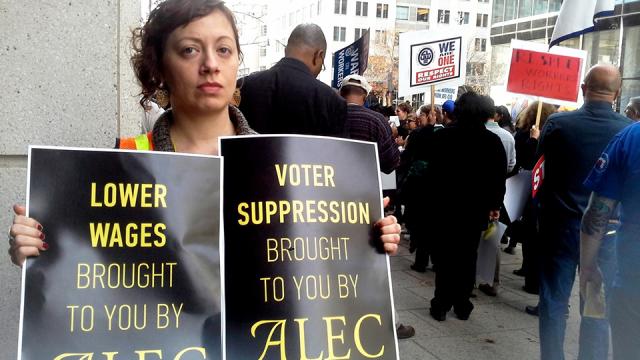
The corporate lobbying network American Legislative Exchange Council, commonly known as ALEC, is seeking to extend its brand of aggressive privatization and tax cuts to the local level, with the launch on Wednesday of a new offshoot focused on America’s cities and counties.
The new network, the American City County Exchange (ACCE), held its first public meeting in Dallas, Texas, on Wednesday. It was timed to sit alongside ALEC’s annual meeting at which the parent body debated its usual menu of conservative priorities – pushing back government regulation, fighting moves to curb climate change, reducing trade union powers and cutting taxes.
A similar emphasis is evident in the first agenda set for the new offshoot, with the distinction that ACCE hopes to influence elected officials in city and county councils while ALEC has its sights largely set on state legislatures.
An early draft of the agenda for Wednesday’s meeting revealingly listed ACCE’s very first workshop under the simple title: “Privatization” – though in the final version the wording had been sanitized into: “Effective Tools for Promoting Limited Government.”
A later workshop scheduled for Thursday was called: “Releasing Local Governments from the Grip of Collective Bargaining.”
ALEC has been described variously as a “corporate bill mill” and as a “corporate dating service.” It brings together lobbyists for big businesses and elected politicians into the same room, and encourages them to frame business-friendly legislation that is then made concrete in the form of model pieces of legislation that are disseminated in state assemblies throughout the country.
The new network, ACCE, will follow the same basic structure, with corporate lobbyists introduced through the organization to elected city and county council members with the aim of promoting policies advantageous to those companies. Big businesses are asked to pay up to $25,000 a year for the privilege of having such direct and intimate input into the legislative process.
In recent months ALEC has suffered a loss of income and membership after it became engulfed in controversy over its backing for “stand-your-ground” laws. The lobbying network was sharply criticized for helping to spread around the country such laws – which give gun owners the right to use deadly force outside the home should they have a reasonably belief that they are in great danger – in the wake of the shooting in Florida of the black teenager Trayvon Martin.
The Guardian disclosed in December that Alec had initiated a “prodigal son project” aimed at attracting back corporate donors that had broken off ties as a result of the “stand-your-ground” furor.
Critics of the organization fear that Alec’s drive towards anti-government policies at state level will now be replicated in cities throughout the country. “Through the new network ACCE, we are likely to see big corporations trying to extend their influence down to the very local level. For relatively little investment, corporations stand not only to have a very big influence over city politicians, but they could also make a lot of money through privatization of public services,” said Nick Surgey, director of research at The Progressive that monitors ALEC’s activities.
Dissent in Conservative Ranks
ALEC’s annual meeting opened in Dallas amid renewed debate about the direction that many Republican-held state legislatures are moving, partly under the encouragement of the lobbying network. The most contentious current example is Kansas, where the Republican governor Sam Brownback introduced earlier this year the largest tax cut in the state’s history.
The tax cuts have left the state with a budget hole that some predictions suggest could reach almost $800 million by 2017. The prospect of massive cuts to public services has prompted a backlash, with 104 present or former Republican officeholders in the state putting out a joint statement earlier this month in which they expressed alarm about the Brownback plan and said they were endorsing his Democratic rival for governor, Paul Davis.
The Brownback tax cuts were devised on the advice of the economist Arthur Laffer. He is the co-author of ALEC’s annual report, Rich States, Poor States, that ranks each state in the country according to a set of conservative standards including low taxes, limited trade union rights and reduced regulations.
Laffer is also centrally involved in the launch of ALEC’s new city initiative. On Thursday he was to be guest of honor at the ACCE lunch.
Surgey said that city-based politicians needed to be wary of the new network. “Under ACCE’s influence, local councils will see more privatization, more public services sold off or cut, and decision-making increasingly in the hands of large corporations far away.”
But Todd Grayson, a city council politician from Perrysburg, Ohio, who is a founding member of ACCE, said the ambition was to increase the efficiency of public services by learning about best practices from all over the country. Though he added: “Clearly, our goal in ACCE is limited government.”
3 WAYS TO SHOW YOUR SUPPORT
- Log in to post comments














